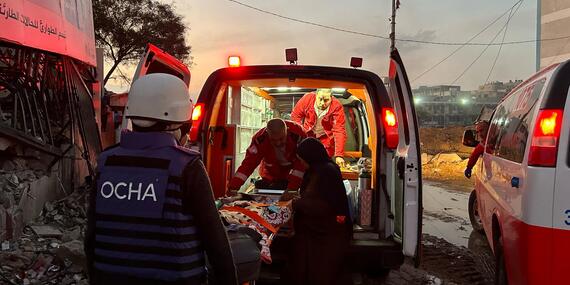Today's top news: Occupied Palestinian Territory, Central Emergency Response Fund, Democratic Republic of the Congo, Sudan

Occupied Palestinian Territory
The Humanitarian Coordinator, Jamie McGoldrick, has wrapped up a visit to Gaza. Today, he visited the Kerem Shalom and Rafah crossings and saw first-hand the challenges there.
The World Health Organization (WHO) said today that it led two life-saving missions to transfer 32 critical patients, including two children, from Nasser Medical Complex in southern Gaza on 18 and 19 February, amid ongoing hostilities and access restrictions. The high-risk missions were conducted in close partnership with the Palestine Red Crescent Society (PRCS) and the Office for the Coordination of Humanitarian Affairs (OCHA). The team also provided limited supplies of essential medicines and food for the remaining patients and staff who are otherwise cut off from aid.
Four Palestine Red Crescent ambulances ensured the safe transportation of the patients, who underwent medical assessment and triage under the coordination of the hospital director.
Nasser Hospital has no electricity or running water, and medical waste and garbage are creating a breeding ground for disease. WHO staff said the destruction around the hospital was ‘indescribable.’ The area was surrounded by burnt and destroyed buildings and heavy layers of debris, with no stretch of intact road.
Yesterday, WHO, along with UNICEF and the World Food Programme, issued results of a new analysis that shows a steep rise in malnutrition among children and pregnant and breastfeeding women in the Gaza Strip.
The report, “Nutrition Vulnerability and Situation Analysis – Gaza,” finds that the situation is particularly extreme in the Northern Gaza Strip, which has been almost completely cut off from aid for weeks. Nutrition screenings conducted at shelters and health centres in the north found that 15.6 per cent – or one in six children under 2 years of age – are acutely malnourished. Of these, almost 3 per cent suffer from severe wasting, the most life-threatening form of malnutrition.
Central Emergency Response Fund
The Emergency Relief Coordinator, Martin Griffiths, today released US$100 million from the UN’s Central Emergency Response Fund (CERF) to support underfunded humanitarian crises in seven countries.
The emergencies in Sudan, Syria and the Democratic Republic of the Congo received $20 million each, with the remaining support going to Chad, Niger, Lebanon and Honduras.
Mr. Griffiths said the new allocation is a reminder of CERF’s crucial role at a time of immense needs and chronic underfunding of humanitarian appeals.
Last year, less than 40 per cent of the $56.7 billion needed to sustain humanitarian appeals around the globe was received. CERF also received less funding in 2023 – the lowest amount in five years.
Mr. Griffiths said it is more critical than ever that Member States provide full and timely funding.
Democratic Republic of the Congo
The UN and our partners, together with the Government today launched the 2024 Humanitarian Response Plan.
The Plan seeks $2.6 billion to provide live-saving assistance and protection to 8.7 million people.
The humanitarian crisis in the country has reached new peaks this year due to the worsening of conflicts, climate-related disasters and a resurgence of measles and cholera.
More than 25 million people are food insecure, while acute malnutrition affects more than 8 million people, mainly children under the age of five, as well as pregnant and lactating women.
Sudan
Efforts to deliver life-saving health assistance to civilians across Sudan continue, despite active conflict and other obstacles.
During the month of January, seven humanitarian partners provided medical consultations to more than 180,000 people in 12 states in Sudan. They also delivered medicine to some 115,000 people in eight states and supported 16 mobile clinics, including in Darfur and Kordofan.
The Humanitarian Coordinator in Sudan, Clementine Nkweta-Salame, stressed that the unimpeded and rapid passage of aid personnel, medicines and other supplies must be ensured to support 25 million people in need of humanitarian assistance in Sudan.
In a social media thread, she said principled and coordinated humanitarian action is dependent on speaking with all parties to conflict to ensure access to civilians, wherever they are. This dialogue is neither endorsement nor collaboration – humanitarian action is neutral, impartial and independent.
